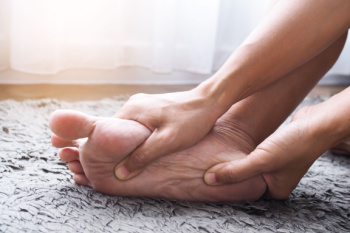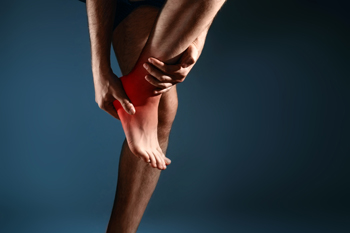
Systemic sclerosis, also known as scleroderma, often affects the small blood vessels, skin, and connective tissues, making the feet particularly vulnerable. Tightening of the skin, joint stiffness, and reduced circulation can all interfere with how the foot moves and bears weight. Walking may become difficult, and standing for long periods of time can lead to discomfort or fatigue. In some cases, ulcers, changes in foot shape, or nerve symptoms may develop, further limiting mobility. Foot pain or reduced function can significantly impact daily activities and overall quality of life. Supportive footwear, targeted exercises, and proper foot care can help maintain comfort and reduce complications. If you are living with systemic sclerosis and noticing changes in how your feet feel or function, it is suggested that you schedule an appointment with a podiatrist for a diagnosis and appropriate treatment.
When dealing with systemic disease of the feet, it is extremely important to check the affected areas routinely so that any additional problems are caught quickly. If you have any concerns about your feet and ankles contact one of our podiatrists from Coastal Foot & Ankle Wellness Center, LLC. Our doctors will assist you with all of your podiatric needs.
Systemic Diseases of the Feet
Systemic diseases affect the whole body, and symptoms usually are displayed in the feet. This condition can make a patient’s ability to walk unbearable. Systemic diseases include gout, diabetes mellitus, neurological disorders, and arthritis.
Gout – is caused by an excess of uric acid in the body. Common symptoms include pain, inflammation, and redness at the metatarsal/phalangeal joint of the base big toe. Gout can be treated by NSAIDs to relieve pain and inflammation, and other drugs that lower the acid levels in the body.
Diabetes mellitus – is an increase in the level of blood sugar that the body cannot counteract with its own insulin. Failure to produce enough insulin is a factor in Diabetes.
Diabetes of the Feet
Diabetic Neuropathy – may lead to damaged nerves and affect the feet through numbness and loss of sensation.
Peripheral Vascular Disease – can restrict the blood flow to the feet, and often times lead to amputation of the feet.
If you have any questions please feel free to contact one of our offices located in St. Augustine, and Palatka, FL . We offer the newest diagnostic and treatment technologies for all your foot and ankle needs.

If you are experiencing heel pain, it could be a sign of bursitis, which is an inflammation of the fluid-filled sacs, or bursae, located at the back of your heel. These sacs help reduce friction between your heel bone, skin, and Achilles tendon. Bursitis typically develops from repetitive pressure, wearing ill-fitting shoes, or conditions like arthritis or heel abnormalities. The pain is usually felt at the back of the heel and may be accompanied by swelling, tenderness, and, in some cases, redness or warmth. It can make walking or standing uncomfortable and may worsen with physical activity. A podiatrist can accurately diagnose bursitis through a physical exam and imaging studies, if necessary. Treatment options include anti-inflammatory medications, fluid drainage, custom orthotics, or protective padding to reduce pressure on the affected area. In severe cases, surgery may be required to remove the inflamed bursa or correct structural issues in the heel. If you have heel pain, it is suggested that you promptly schedule an appointment with a podiatrist for an accurate diagnosis and effective treatment.
Many people suffer from bouts of heel pain. For more information, contact one of our podiatrists of Coastal Foot & Ankle Wellness Center, LLC. Our doctors can provide the care you need to keep you pain-free and on your feet.
Causes of Heel Pain
Heel pain is often associated with plantar fasciitis. The plantar fascia is a band of tissues that extends along the bottom of the foot. A rip or tear in this ligament can cause inflammation of the tissue.
Achilles tendonitis is another cause of heel pain. Inflammation of the Achilles tendon will cause pain from fractures and muscle tearing. Lack of flexibility is also another symptom.
Heel spurs are another cause of pain. When the tissues of the plantar fascia undergo a great deal of stress, it can lead to ligament separation from the heel bone, causing heel spurs.
Why Might Heel Pain Occur?
- Wearing ill-fitting shoes
- Wearing non-supportive shoes
- Weight change
- Excessive running
Treatments
Heel pain should be treated as soon as possible for immediate results. Keeping your feet in a stress-free environment will help. If you suffer from Achilles tendonitis or plantar fasciitis, applying ice will reduce the swelling. Stretching before an exercise like running will help the muscles. Using all these tips will help make heel pain a condition of the past.
If you have any questions please contact one of our offices located in St. Augustine, and Palatka, FL . We offer the newest diagnostic and treatment technologies for all your foot and ankle needs.

Although Achilles tendon injuries are more common in adults, they can also affect active children and teenagers. This strong tendon connects the calf muscles to the heel and helps with walking, running, and jumping. Injuries may occur from overuse, a sudden increase in activity, or wearing unsupportive footwear. Children may complain of pain or tightness at the back of the heel, especially after sports. Swelling or tenderness along the tendon may also appear. Ignoring early symptoms can lead to more serious problems. Because children’s bones and tendons are still developing, proper care is important. If your child has pain at the back of the heel that does not improve, it is suggested that you see a podiatrist for evaluation and appropriate care plan.
Achilles tendon injuries need immediate attention to avoid future complications. If you have any concerns, contact one of our podiatrists of Coastal Foot & Ankle Wellness Center, LLC. Our doctors can provide the care you need to keep you pain-free and on your feet.
What Is the Achilles Tendon?
The Achilles tendon is a tendon that connects the lower leg muscles and calf to the heel of the foot. It is the strongest tendon in the human body and is essential for making movement possible. Because this tendon is such an integral part of the body, any injuries to it can create immense difficulties and should immediately be presented to a doctor.
What Are the Symptoms of an Achilles Tendon Injury?
There are various types of injuries that can affect the Achilles tendon. The two most common injuries are Achilles tendinitis and ruptures of the tendon.
Achilles Tendinitis Symptoms
- Inflammation
- Dull to severe pain
- Increased blood flow to the tendon
- Thickening of the tendon
Rupture Symptoms
- Extreme pain and swelling in the foot
- Total immobility
Treatment and Prevention
Achilles tendon injuries are diagnosed by a thorough physical evaluation, which can include an MRI. Treatment involves rest, physical therapy, and in some cases, surgery. However, various preventative measures can be taken to avoid these injuries, such as:
- Thorough stretching of the tendon before and after exercise
- Strengthening exercises like calf raises, squats, leg curls, leg extensions, leg raises, lunges, and leg presses
If you have any questions please feel free to contact one of our offices located in St. Augustine, and Palatka, FL . We offer the newest diagnostic tools and technology to treat your foot and ankle needs.








